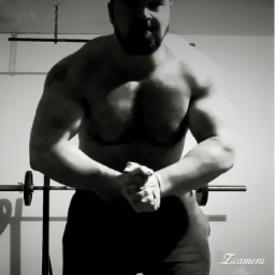Strenght training program without power lifting

ronbo62098
Posts: 59 Member
My weight is dropping (slowly, but dropping), so I'm on the right track there. I'd also like to start getting stronger, so I'm looking for a strength program. Problem is, due to medical issues, I can't do any heavy lifting - long story short: cardiologist says "no power lifting". So, any thoughts or suggestions on how to get stronger using something other than iron barbells?
0
Replies
-
I've heard good things about 'you are your own gym' and 'convict conditioning' which are body weight programmes.0
-
You should do body weight exercises. For example, if you can already do full push ups, there are many other variations out there to keep challenging your body to build muscle.
Variations can be found here: http://www.myweightlifting.com/push-up-variations/0 -
You should go ask someone with experience in weight training AND medicine what their opinion is on this matter. Cardiologists know everything about cardiology and nothing about exercise. I would ask an exercise physiologist as most of them work in cardiac rehab.0
-
You could train using your bodyweight. There really is no limit to what you can accomplish and its fun.
Here's a detailed guide for using you bodyweight to build strength that I wrote for total beginners:
http://strengthunbound.com/bodyweight-strength-training-beginners-guide/0 -
Thanks for the links on bodyweight training - I'll check those out.
@Lofteren - my cardiologist was in charge of my cardio rehab after my second heart operation. Granted, I've had cardiologists in the past where I had to question everything, but this guy knows his stuff.0 -
My concern is to the reason why no "power lifting"? Once you get beyond beginner stages, there are times where even though I'm working out with "only" body weight, I'm as tensed and tight as if I had 300# on a bar.
Is it and effort/intensity based restriction? I'd definitely talk more with your doc.0 -
If you're looking for a "strength" program, that would include overloading poundages. If you're looking for a "resistance" program, it can be done with just body weight alone.My weight is dropping (slowly, but dropping), so I'm on the right track there. I'd also like to start getting stronger, so I'm looking for a strength program. Problem is, due to medical issues, I can't do any heavy lifting - long story short: cardiologist says "no power lifting". So, any thoughts or suggestions on how to get stronger using something other than iron barbells?
The reason your cardiologist doesn't want you to lift heavy is because blood pressure increases immensely during a heavy lift and for some with heart problems, it's not recommended.
If you were my client, I would just have you do a resistance training program relying on resistance that you can do for higher reps.
A.C.E. Certified Personal/Group FitnessTrainer
IDEA Fitness member
Kickboxing Certified Instructor
Been in fitness for 30 years and have studied kinesiology and nutrition0 -
Thanks for the links on bodyweight training - I'll check those out.
@Lofteren - my cardiologist was in charge of my cardio rehab after my second heart operation. Granted, I've had cardiologists in the past where I had to question everything, but this guy knows his stuff.
I said that because his lack of knowledge is reflected in his recommendation. I'm not questioning whether or not this guy knows his stuff when it comes to cardiology but he has no training in exercise which is apparent. Doing a pull up or even a set of pushups can cause just as much cardiac stress and as much of a jump in blood pressure as doing a heavy deadlift. This is especially true if you utilize the valsalva maneuver (which most people do without realizing it when they strain). This is why I said to go get a second opinion from someone who knows more about exercise because your doc clearly does not.0 -
I said that because his lack of knowledge is reflected in his recommendation. I'm not questioning whether or not this guy knows his stuff when it comes to cardiology but he has no training in exercise which is apparent. Doing a pull up or even a set of pushups can cause just as much cardiac stress and as much of a jump in blood pressure as doing a heavy deadlift. This is especially true if you utilize the valsalva maneuver (which most people do without realizing it when they strain). This is why I said to go get a second opinion from someone who knows more about exercise because your doc clearly does not.
Actually, what you are saying matches what he is telling me. Exercises where you create a lot of strain/increased blood pressure are bad for me. Whether that is from overdoing a pullup (valsalva as you noted) or a heavy deadlift, the spike in blood pressure can cause issues. In my original post I said "long story short: no power lifting". The longer story is I cannot do ANY exercise that requires extreme straining. The stress on the heart (specifically the aorta - which I have had replaced) is too much.
I noted power-lifting in particular because that was essentially the answer I was getting 100% of the time when asking about strength training. I can do light training, but if I have to "hold my breath and push" that's too much. Bodyweight seems to be a choice in that I can do several push-ups or no-barbell squats without strain. Whether or not that will help much with strength training, I don't know - thus my original question.
@rybo & ninerbuff - yeah, spikey blood pressure is the issue. So, any routine will have to be low-impact, multiple reps. Basically, if I can't do it 10 times, don't do it once. So, to rephrase my original question: what kinds of repetitive motion/exercises are most likely to give the biggest benefit strength wise.0 -
That's clearer.
So at this point its personal preference. You can do traditional barbell/dumbell moves using a weight that you can handle more than 10 reps with. Or select a bodyweight exercise of the same difficulty. It's the intensity that requires limiting, not how it's achieved. I'd also reccomend leaving a few reps in the tank, regardless of what you choose Basically you are going to be relegated to muscular endurance training, and not a whole lot of big strength gains.0 -
Okay, well this information is important to tell what you can and can't do. You're not banned from doing powerlifting movements, you're just banned from going really heavy and having to strain really hard which is good because it would be more beneficial for you to train with a combination of bodyweight movements and barbells/dumbbells than it would be for you to just do bodyweight movements alone. Just keep the weight to where you're able to do more than 10 repetitions per set and you should be good to go. I would steer clear of the machines. They're tempting to some people because they're an easy way out of hard work but they won't provide as much bang for your training buck as actual, weighted implements.
"Power Lifting" involves lifting weights near your 1 repetition maximum on a regular basis so obviously this would be a problem but squatting, bench pressing and deadlifting don't necessarily have to cause a massive amount of strain because you can keep the weights low enough.0 -
My first research into lifting was the SL 5x5 program that seems to popular with beginners. Two minutes of reading that and I was like, "yeah, THAT ain't gonna happen". But, sounds like you're recommending those types of moves - just not the "add 5 pounds each workout" or fatigue at 5 reps parts? Not sure how dorky I'll look doing squats with a broomstick, but got to start somewhere. On that note, what's your thoughts on kettle-bell squats since even a 45 lb "empty" bar is a bit much for me to start with? I've never lifted at all (aside from hay bales), so I'm looking for simple (to learn) moves/routine to get started.0
-
The Barbell Back Squat is pretty much superior to any other lift, even other kinds of squats. If there were only 1 lift you were ever allowed to do, that should be it. Unless you have some sort of orthopedic problems that prevent you from doing so, I absolutely guarantee you can squat the 45lb bar for a set of 5 reps without putting too much strain on your cardiovascular system. The limiting factor for you will probably be flexibility so get warmed up really well, do a lot of static stretching and a bunch of sets of bodyweight squats before you put the bar on your back and you should be just fine.
If I were you, I would do a modified stronglifts 5x5, start with the bar and add 5lbs a workout until you start having to strain to lift the weights. Then I would keep the weights there until you no longer have to strain and add another 5lbs. A good indicator of "strain" in weight lifting is the color of your face, so if you're not starting to turn red, you're not really straining that hard. Your face turning red is a result of heightened blood pressure so it coincides proportionally with what you are trying to avoid.0
This discussion has been closed.
Categories
- All Categories
- 1.4M Health, Wellness and Goals
- 398.1K Introduce Yourself
- 44.7K Getting Started
- 261K Health and Weight Loss
- 176.4K Food and Nutrition
- 47.7K Recipes
- 233K Fitness and Exercise
- 462 Sleep, Mindfulness and Overall Wellness
- 6.5K Goal: Maintaining Weight
- 8.7K Goal: Gaining Weight and Body Building
- 153.5K Motivation and Support
- 8.4K Challenges
- 1.4K Debate Club
- 96.5K Chit-Chat
- 2.6K Fun and Games
- 4.8K MyFitnessPal Information
- 12 News and Announcements
- 21 MyFitnessPal Academy
- 1.5K Feature Suggestions and Ideas
- 3.2K MyFitnessPal Tech Support Questions





